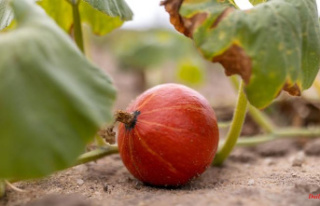Cries of pain can often be heard on playgrounds or swimming pool meadows: "A wasp stung me". No wonder there are a lot of black and yellow insects buzzing around. But something is changing: her favorite food.
Munich (dpa / lby) - Cake instead of ham: The food preferences of the wasps, which many find annoying in summer, are changing. In the past few weeks, the insects have enjoyed savory foods such as sausage, meat or eggs in order to feed the protein-rich food to the larvae. But the rearing of the young is now over, says biologist Angelika Nelson from the State Association for Bird Protection (LBV) in Hilpoltstein. Currently, only the workers have to feed themselves. "They're going for sweets now."
If you want to enjoy fruit juice, ice cream or cake outdoors, you have to be careful, as common wasps or German wasps usually settle on them. "Because the food supply for the two species in nature is very scarce this year, more animals are coming to visit the dining table," reports Hans Greßirer from the Bund Naturschutz in Munich. Other species such as the middle, the Norwegian or the red wasp, on the other hand, are already dying off again - and are not perceived as a nuisance by people anyway.
Nelson estimates that it won't be until the beginning of September before the common and German wasps disappear. In mid-August, the number of workers in a wasp colony peaks. Up to 4000 of the insects could then live in one nest, which would live on average 12 to 22 days. "In the fall everyone dies and only the queen hibernates to start a new colony in the spring." Until then, experts advise spraying annoying animals with the water atomizer to make them think it's raining, which is driving them into the nest.
The warm, dry spring was ideal for the wasps, which are considered important pollinators. A climate change with warmer temperatures and less precipitation could even have a positive effect. "The warmer and drier the better for a wasp nest," explained Nelson, but also warned: "Even wasps can't stand arbitrarily hot temperatures and need water and energy to regulate their body temperature."












